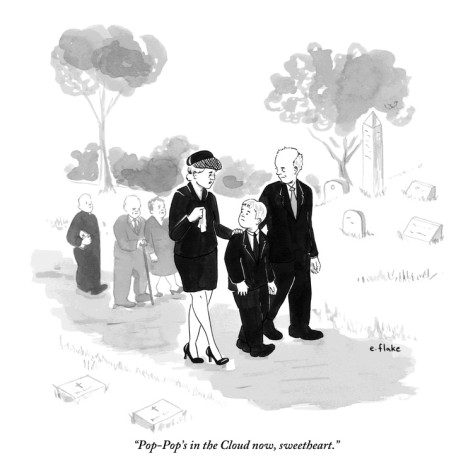
Just in time for Ash Wednesday, we are getting word that copies of the first issue of The Mockingbird are (finally) making their way into your mailboxes. If you are on our mailing list, and yours has not made its way to you yet, fear not, it should be there by week’s end.
And what better way to honor the holiday of our ashes than take a look into R-J Heijmen’s essay on, yes, death? It appears on page 100 of the first issue.
If you have not signed up to receive The Mockingbird, it’s not too late. Come one, come all!
My two sons have never seen a dead body. Of course, this is only partly true. They’ve seen innumerable dead bodies on the myriad screens which occupy so much of their lives. But it’s not quite the same, is it? A collection of pixels which disappears shortly after hitting the ground—nameless, storyless bits of code ceasing to exist—is not the same as an expired hunk of beloved flesh.
Come the think of it, I’ve never seen a dead body either. Or have I? I vaguely remember a twitching leg left exposed by a not-quite-large-enough sheet of white on a 7th Avenue sidewalk near Carnegie Hall. Was it a dream? If not, I was about 12 years old at the time.
Another occurrence comes to mind, though again as if in a mist. I was in my second floor apartment in Paris during a college year abroad when, through the open window, I heard a sharp yell, followed by a thud on the street below. Peering over my small balcony, I saw a young man sprawled and motionless in the road, pedestrians beginning to gather round him, looking down and pointing up to a floor above mine. I just now verified with my wife (whom I was dating at the time) that this actually happened. Perhaps the trauma of the event, or its incompatibility with the rest of my life narrative, has caused my brain to file it away under “miscellaneous.”
And while my sons may have never seen a dead body (nor has my wife), they recently attended their first funeral, a thirteen year-old boy at their school having lost his battle with cancer.
When I consider my family’s close encounters with death—an accident, a suicide, a tragic disease—they are linked by their exceptionalism. In Woody Allen’s Annie Hall (1977), Alvie Singer opines that “life is divided into the horrible and the miserable. That’s the two categories. The horrible are like, I don’t know, terminal cases, you know, and blind people, crippled. I don’t know how they get through life. It’s amazing to me. And the miserable is everyone else.” Put in these terms, all of the deaths to which we have been witnesses were horrible. They were in the realm of the exceptional, the unusual, rather than the quotidian, the simply miserable.
In my experience, many (perhaps most) people don’t have an intimate experience with death until one of their parents passes away, and given the average American life span, this may not occur until well into their middle life. This is an exceptional set of circumstances in the sweep of human history, and while we may rightly rejoice that death is not the close companion it once was, it may be that the chasm that has opened between us and the experience of dying has some unfortunate consequences.
…When I appraised my wife of the topic on which I would be writing for this article, her reaction was twofold: “Well, that sounds like something I would have no interest in reading!” and “Why would I want to think about death? It’s so depressing!” How encouraging she is. And of course, quite correct. Death is something to avoid, to deny, as Ernest Becker says, at all costs. It is the final defeat, the ultimate mark of our utter powerlessness.
When I visit dying people, usually in the hospital (more on that later), I can’t escape the impression that they resemble, more than anything else, infants. They are small and weak, helpless and in need of constant attention: sleeping, drooling, toothless, hairless, swaddled, cradled, diapered. We enter this world dependent and exit in the same way, and all of our efforts at mastery in between are, at the end, revealed for the hollow charades they always were. “Truly I tell you,” Jesus says, “unless you change and become like little children, you will never enter the kingdom of heaven”(Matt 18.3), and apparently we have no choice in the matter.
So, if talk about death is depressing and to be avoided, why do it? Well, to paraphrase (and perhaps subvert?) one William Wallace, I’m not sure that we can ever truly live until we embrace that we will one day die. In Christian circles, we often say that Easter comes by way of Good Friday. You have to go through the “valley of the shadow of death” to reach the Mount of Transfiguration. You can’t leapfrog death on your way to resurrection. As Bono puts it, “always pain before the child is born…why the dark before the dawn?”
Practically speaking, I find that remembering death, seeing death, thinking about and embracing death, lowers the anxiety that surrounds so much of my living. “Remember man, that dust thou art, and unto dust thou shalt return.” These are the terrifying, and yet profoundly liberating, words of Ash Wednesday. You’re not that important. Your children aren’t that important. Where you live and what job you have and where your kids go to school and what kind of car you drive and whether or not you’re able to pay your bills or achieve any career success or manage to get anyone to think highly of you or read your depressing and poorly written essay isn’t that important. Now, don’t you feel better?
The theologian Gerhard Forde has written that it is God’s work, and hope, to take us unhappy little gods and make us into true humans, and I can think of no better way to accomplish this than to bring us in touch, regularly and powerfully, with our own mortality. When I think of my children, about the happiness and freedom I so desperately want for them, there seems no more potent possible prescription than exposure to ordinary, miserable, inevitable death. Struggling with your homework? Your friends? Your love life? Don’t worry, it’ll only hurt for a minute, and it will all be over soon. I’m only slightly kidding.
When I perform baptisms, I sometimes (when I’m feeling courageous) remind the parents that we have gathered together in order to put their infant to death, or at least to acknowledge that their perfect little bundle of joy is, in St. Paul’s words “dead in (its) transgressions and sins” (Eph 2.1). Water is, Biblically speaking, a symbol of death (think Noah, Jonah, Charlton Heston at the Red Sea), and to submerge, or even sprinkle a person is to be reminded that we are all dead men walking, and that our only hope for life lies in a Power greater than our own. Perhaps one of the chief jobs of parenting ought to be habituating our children to the reality that they are not, naturally speaking, immortal. It might create greater anxiety in the short-term, but the long-term benefits could be great.
Of course this will never happen. Our thirst for glory & godhood (since the Garden) is such that, left to our own devices, we will ignore, avoid and deny death at all costs, as Gawande so potently describes. Thus, hospitals…
To read on, order your copy of The Mockingbird.
[youtube=http://www.youtube.com/watch?v=LtVgr4OrfcE&w=600]

COMMENTS
2 responses to “Dying to Live: An Ash Wednesday Magazine Sneak Peek”
Leave a Reply















So if I’m on the mailing list and I haven’t received it by now (the end of the week), should I shoot you an email?
Sounds like people are still receiving them. Email us if it hasn’t arrived by Tuesday. Thanks, B.